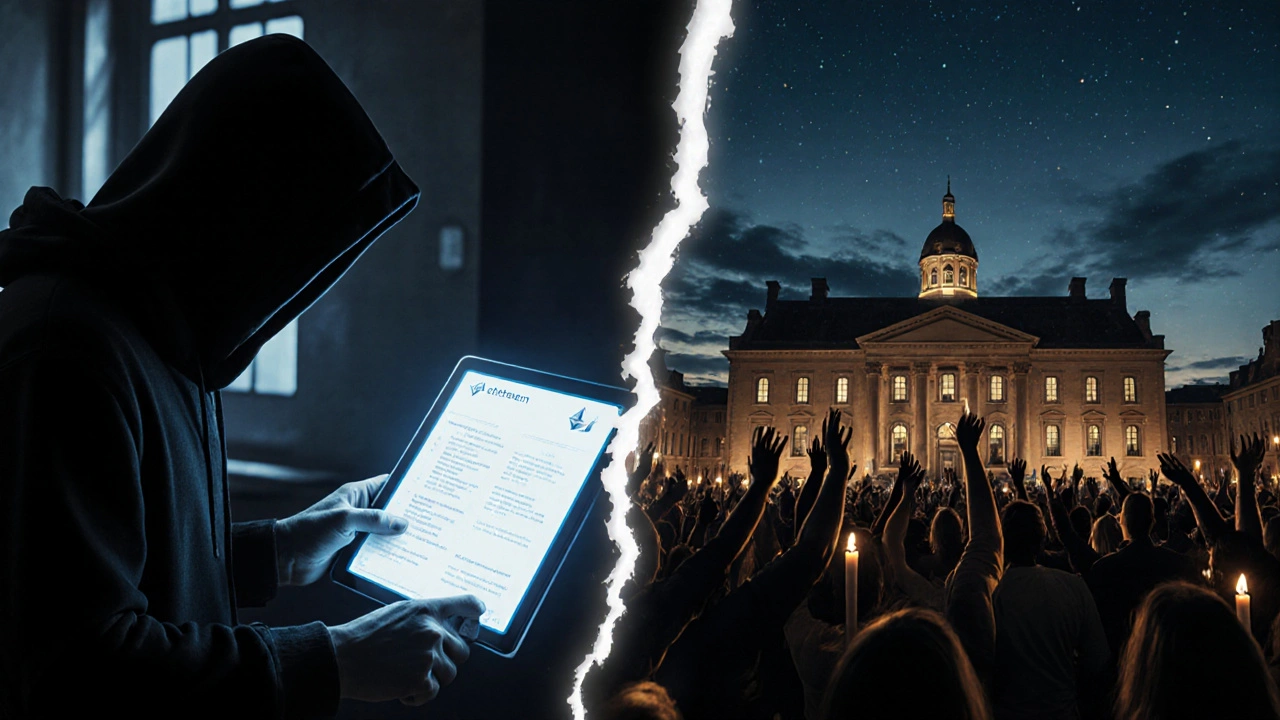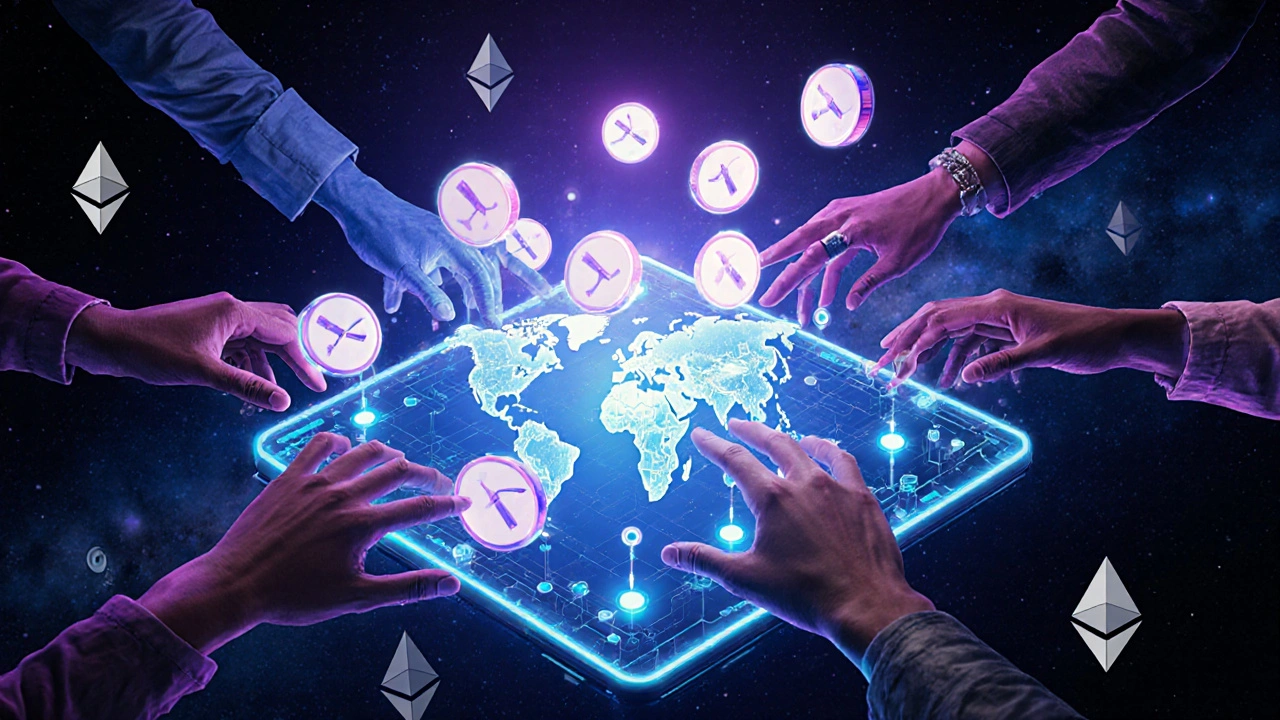A DAO isn’t a company you can walk into. It doesn’t have a CEO, an office, or even a physical address. Instead, it runs on code-smart contracts locked on a blockchain-and is governed by its members, who vote using tokens. If that sounds like science fiction, you’re not alone. But by 2025, over 4,200 DAOs are managing more than $28 billion in digital assets, and companies from startups to Fortune 500 firms are testing them. So what exactly is a DAO, and why does it matter?
How a DAO Works: No Bosses, Just Code
Think of a DAO as a digital cooperative where rules aren’t written in employee handbooks but in self-executing code. These rules-called smart contracts-are stored on a blockchain, usually Ethereum. Once deployed, they run automatically. No one can change them without approval from the group. That’s the core idea: trustless collaboration.
Every member gets voting power based on how many governance tokens they hold. If you own 1% of the tokens, you get 1% of the votes. Proposals can be anything: spend $50,000 on a marketing campaign, hire a developer, or change how new members join. All proposals are public. All votes are recorded forever on the blockchain. You can check them anytime on sites like Etherscan.
There’s no middleman. No HR department approving budgets. No board meeting delaying decisions. If enough members vote yes, the smart contract automatically releases funds or updates the system. This is what makes DAOs different from traditional organizations: everything is transparent, and no single person controls the outcome.
The First DAO and the $60 Million Hack
The first major attempt at a DAO was called, simply, “The DAO.” It launched in April 2016 on the Ethereum network. It raised $150 million in Ether from over 11,000 investors-making it one of the largest crowdfunding campaigns ever at the time.
But just two months later, a hacker exploited a flaw in its code. They drained $60 million worth of Ether. The Ethereum community was split. Some wanted to leave the blockchain as it was-immutable, unchangeable. Others argued that the hack was a violation of the spirit of the project. In July 2016, Ethereum executed a hard fork: a radical software update that reversed the theft. This created two blockchains: Ethereum (ETH), which erased the hack, and Ethereum Classic (ETC), which preserved the original history.
The DAO hack exposed a harsh truth: code isn’t perfect. And when money is involved, even small bugs can cost millions. Since then, every serious DAO runs its code through multiple audits by firms like OpenZeppelin and Quantstamp. Still, the lesson stuck: decentralization doesn’t mean immunity from risk.

How DAOs Are Used Today
Today’s DAOs aren’t trying to replace entire companies. They’re filling specific gaps where traditional structures fall short.
Take MakerDAO, founded in 2017. It governs the DAI stablecoin, which stays pegged to the US dollar. Instead of a central bank setting interest rates, MakerDAO’s members vote on changes to fees, collateral rules, and risk parameters. Over 1.7 million people hold its governance token and participate in decisions.
Or consider ConstitutionDAO, which raised $47 million in just 72 hours in 2021 to buy a rare copy of the U.S. Constitution. It didn’t win the auction-but it proved DAOs could mobilize global communities around a single goal faster than any corporation could.
Most DeFi protocols-like Uniswap, Aave, and Compound-are now run as DAOs. They control over $22 billion in assets. Their members vote on fee structures, new token listings, and even how to allocate treasury funds. In fact, 92% of the top DeFi platforms use DAO governance.
Even big companies are watching. According to Gartner, 63% of Fortune 500 companies are experimenting with DAO structures, mostly in innovation labs. Some are testing them for community rewards, open-source development, and decentralized marketing campaigns.
Pros and Cons: Why DAOs Are Powerful-but Flawed
DAOs have clear advantages. Transparency is one. Every vote, every transaction, every proposal is public. There’s no hidden agenda. Accountability is built in.
They also enable global participation. Someone in Jakarta, a student in Nairobi, or a retiree in Edinburgh can join a DAO and vote on decisions that affect millions. No visa, no job application, no corporate ladder.
But there are big downsides.
Decision-making is slow. While a CEO can approve a $10,000 spend in minutes, a DAO proposal can take 7 to 14 days to pass. Why? Because every vote needs to be counted, and participation rates are low. On average, only 15-25% of token holders vote on any given proposal. That means a small group can swing the outcome.
Then there’s the legal gray zone. In most countries, DAOs don’t have legal status. Are they partnerships? Corporations? Unincorporated associations? If a DAO gets sued, who’s liable? Only three U.S. states-Wyoming, Tennessee, and Utah-have passed laws recognizing DAOs as legal entities. The EU’s MiCA regulation (effective 2024) now requires DAOs to follow anti-money laundering rules. And in 2023, the SEC sued YieldShares DAO, claiming its tokens were unregistered securities.
And let’s not forget the human factor. Voting fatigue is real. In August 2022, ApeCoin DAO’s Proposal #102 failed because it needed 60% approval-but only got 54.3%. $10 million in grant money sat untouched because too few people showed up to vote.

How to Get Involved (Without Coding)
You don’t need to be a programmer to join a DAO. Most don’t require technical skills. Here’s how to start:
- Buy governance tokens. You can get them on exchanges like Uniswap or Coinbase. Tokens like MKR (MakerDAO), AAVE (Aave), or COMP (Compound) give you voting rights.
- Join the community. Most DAOs have Discord servers, Telegram groups, or forums like Discourse. Read past proposals. See how people talk.
- Start small. Vote on minor proposals-changing a logo, approving a meme contest. Get used to the rhythm.
- Delegate your vote. If you don’t have time to research every proposal, you can assign your voting power to someone you trust. Over 76% of large DAOs use delegation.
Platforms like Juicebox and Snapshot make it easy to participate without paying gas fees. Snapshot lets you vote off-chain using your wallet signature. No transaction needed. Just a click.
The Future: Hybrid DAOs and Legal Wrappers
DAOs aren’t going to replace corporations overnight. But they’re evolving.
One big shift is the rise of hybrid models. Many DAOs now use “legal wrappers”-official LLCs or foundations that act as a legal shield. MakerDAO, for example, works through a Swiss foundation. This lets them hire employees, sign contracts, and open bank accounts.
Another trend is delegated voting. Instead of every member voting on everything, members elect representatives (delegates) to vote on their behalf. This speeds things up without giving power to a few insiders.
AI is also entering the space. MetaCartel Ventures piloted AI tools that draft proposal summaries and flag potential risks. Ethereum’s Dencun upgrade in January 2024 slashed transaction costs by 90%, making participation cheaper than ever.
By 2027, Grand View Research predicts 75% of DAOs will adopt legal wrappers. And Forrester forecasts that 45% of S&P 500 companies will use DAOs for innovation projects by 2026.
But the real question isn’t whether DAOs will grow. It’s whether we can build systems that balance freedom with responsibility. DAOs give power to the crowd. But power without structure leads to chaos. The next generation of DAOs will need better tools, clearer rules, and smarter participation-not just more code.
Can anyone join a DAO?
Yes, as long as you have the required governance tokens. Most DAOs are open to anyone with internet access and a crypto wallet. You don’t need permission, a resume, or a passport. But you do need to buy or earn tokens to vote. Some DAOs also require you to complete a simple onboarding process, like joining a Discord server or reading community guidelines.
Do DAOs make money?
DAOs themselves don’t “make money” like a company does. Instead, they manage treasuries funded by token sales, fees, or donations. For example, MakerDAO earns fees from users borrowing DAI. Aave collects interest from its lending pools. These funds are held in the DAO’s treasury and voted on by members-whether to pay developers, buy assets, or distribute rewards. Some DAOs have generated millions in revenue, but many operate at a loss, funded by early supporters.
Are DAOs legal?
Legally, it’s complicated. In most countries, DAOs have no official status. You can’t sue a DAO like a company because it’s not recognized as a legal entity. Only a few places-Wyoming, Tennessee, Utah in the U.S., and some regions in the EU under MiCA-have started creating legal frameworks. Many DAOs now form legal wrappers (like LLCs) to handle contracts, taxes, and liability. But without a legal structure, members could be personally liable for the DAO’s actions.
What’s the difference between a DAO and a traditional company?
A traditional company has a hierarchy: CEO, managers, employees. Decisions flow top-down. A DAO has no hierarchy. Decisions are made by members voting with tokens. Everything is public and automated via code. Companies rely on lawyers and contracts. DAOs rely on smart contracts and community trust. Companies can fire people. DAOs can only vote to remove access. Companies are private. DAOs are open by design.
Can you lose money in a DAO?
Absolutely. If you buy governance tokens and the DAO fails-due to poor management, a hack, or loss of community trust-their value can crash. Wonderland DAO lost 99.8% of its token value in 2023 after mismanaging its treasury. Even if the DAO survives, your tokens might not. And if you vote on a bad proposal, your funds could be spent in ways you disagree with. DAOs offer freedom, but freedom comes with risk.
What’s the point of a DAO if voting is so slow?
The point isn’t speed-it’s fairness and resilience. Slow voting prevents a single person or group from taking control. It gives time for debate, research, and dissent. While a CEO might make a bad decision in 10 minutes, a DAO takes days to reach consensus. That’s intentional. It reduces the chance of reckless moves. Many DAOs now use delegation and off-chain signaling to speed things up without sacrificing transparency.



Comments (8)
Jessica McGirt November 27 2025
DAOs are the closest we’ve gotten to true digital democracy-and it’s messy, beautiful, and terrifying all at once. I love that someone in Nairobi can vote on a proposal that affects someone in Nebraska. No middlemen. No corporate ladder. Just code and consensus. But the low turnout? That’s the real flaw. It’s not about decentralization-it’s about engagement. We need better onboarding, not just more tokens.
Donald Sullivan November 28 2025
Stop pretending DAOs aren’t just crypto cults with fancy whitepapers. The ‘trustless’ thing? Bullshit. Someone wrote the code. Someone deployed it. Someone still holds the keys to the treasury. And when it blows up? The ‘community’ gets blamed while the devs cash out. I’ve seen this movie before-remember Mt. Gox? Same script, different blockchain.
Ronak Khandelwal November 29 2025
DAOs = digital kumbaya 🌍✨ But seriously, the magic is in the *potential*. Imagine a global collective deciding how to fund open-source tools, or how to distribute climate grants-no gatekeepers, no bureaucracy. Yeah, voting is slow. Yeah, some proposals suck. But that’s the point! It forces us to think, not react. I’ve seen shy students in Jakarta become proposal writers because someone said, ‘Your voice counts.’ That’s worth the wait. 🙌
Jeff Napier November 30 2025
DAOs are a Fed control mechanism disguised as freedom. You think you're voting? Nah. The big wallets-those whale addresses-are the real owners. They buy tokens in bulk, push proposals through, then sell. The ‘community’ is just noise to make it look legit. And the legal wrappers? That’s the giveaway. If it needed an LLC to function, it was never decentralized to begin with. The whole thing’s a pyramid with blockchain glitter on it.
Sibusiso Ernest Masilela December 2 2025
How can you even call this governance? A bunch of degens voting on whether to buy a meme coin or fund a Discord bot. Real organizations have bylaws, boards, audits. DAOs have Discord threads and 3am votes from people who bought their tokens because a guy on Twitter said ‘to the moon.’ This isn’t innovation-it’s chaos dressed in a crypto hoodie. And the fact that people take this seriously? Pathetic.
Daniel Kennedy December 3 2025
Don’t dismiss DAOs just because they’re imperfect. The fact that they exist at all is revolutionary. Yes, voting is slow. Yes, some people game the system. But look at what they’ve achieved: $28B in assets managed without a single CEO. No one’s getting fired for a bad call-everyone’s accountable. The real problem isn’t DAOs-it’s that we’re trying to force them into old-world boxes. We need new tools, new norms. And guess what? They’re already being built. Delegation, AI summaries, off-chain voting-this isn’t the end, it’s the beta.
Taylor Hayes December 3 2025
I started in a DAO last year just to vote on a logo change. Didn’t know what I was doing. But I read the proposals, asked questions in Discord, and slowly got it. Now I delegate my vote to someone who researches everything. It’s not perfect-but it’s mine. I don’t have to ask permission to contribute. I just do. That’s the power. And honestly? The slow voting? It saved me from backing a dumb proposal last month. Took 10 days. I changed my mind. That’s not a bug. That’s a feature.
Sanjay Mittal December 4 2025
Just to clarify something: DAOs don’t replace companies-they replace *decision-making layers*. MakerDAO doesn’t run a bank, it runs the rules for DAI. Uniswap doesn’t hire traders, it lets holders vote on fee tiers. The real innovation is separating governance from operations. You can still have employees, lawyers, and offices-but the power to change the rules? That’s in the hands of the users. And that’s new. Most people miss that distinction.